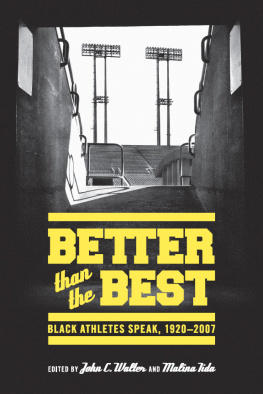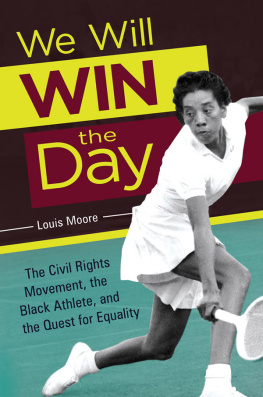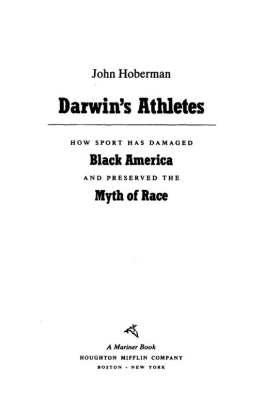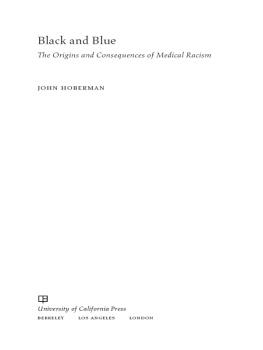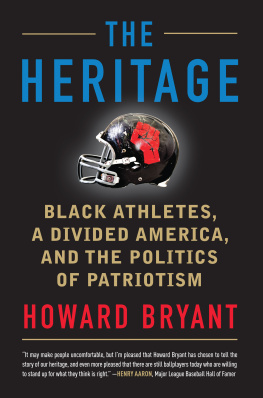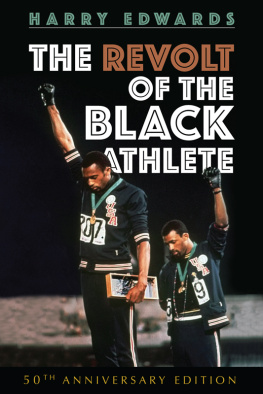Copyright 1997 by John Hoberman
All rights reserved
For information about permission to reproduce selections from this book, write to or to Permissions, Houghton Mifflin Harcourt Publishing Company, 3 Park Avenue, 19th Floor, New York, New York 10016.
www.hmhco.com
Library of Congress Cataloging-in-Publication Data
Hoberman, John M. (John Milton).
Darwins athletes : how sport has damaged black America and
preserved the myth of race / John Hoberman.
p. cm.
Includes bibliographical references (p. ).
ISBN 0-395-82291-2
ISBN 0-395-82292-0 (pbk.)
1. Afro-American athletesPublic opinion. 2. Public
opinionUnited States. 3. Stereotype (Psychology) in sports.
4. Afro-AmericansAttitudes. 5. United States
Race relations. I. Title.
GV 583. H 6 1997
796.08996073 dc20 96-36170 CIP
eISBN 978-0-547-34854-4
v2.1017
This book is
dedicated to the memory
of
RALPH ELLISON
Acknowledgments
Many people have contributed to the making of this book. I would like to thank Lincoln Allison, Katie Arens, Cara Aver hart, John Bale, Bjrn Barland, David Black, Claud Bramblett, David Broad, Lindsey Carter, Mike Fish, Alan Goodman, Edmund T. Gordon, Allen Guttmann, David Hoberman, Henry Hoberman, M.D., Craig Hodges, Richard Holt, Philip Houghton, Tim Hutton, Grant Jarvie, Andrew Jennings, Bruce Kidd, Tim King, William Kraemer, Sigmund Loland, John Loy, Robert Malina, Jonathan Marks, Charles Martin, Dennis McFadden, Patrick Miller, Lesley Nye, Robert Nye, Jeffrey Sammons, Clark T. Sawin, M.D., Lawrence Schell, Yevonne Smith, Waneen Spirduso, Melbourne Tapper, Rick Telander, John Valentine, David Wiggins, John Williams, Bruce Wilson, and Charles Yesalis.
Among this group, I am particularly grateful to those colleagues who read, assessed, and criticized portions of the manuscript. It goes without saying that I bear full responsibility for the text, which benefited so much from their efforts. Special thanks go to my research assistant, Laura Issen, whose hard work and initiative made a real difference to this book.
I would also like to thank the many students who took my course Race and Sport in African-American Life at the University of Texas, and in particular those who shared with me their personal knowledge and experiences regarding race relations and racialistic thinking.
To my editor, Steve Fraser, I convey my deepest thanks for his unwavering commitment to a project whose potential value he saw from the very beginning. Steves enthusiasm and intellectual companionship are what made this book possible.
And once again I thank my wife, Louisa, for the patience and generosity she has shown in the course of a long project.
I PROPOSE THAT WE VIEW
THE WHOLE OF AMERICAN LIFE
AS A DRAMA
ACTED OUT UPON THE BODY
OF A NEGRO GIANT.
Ralph Ellison, Shadow and Act
Preface to the Mariner Edition
The publication of Darwins Athletes in early 1997 set off a national debate that lasted for months and has now begun to reverberate in the pages of academic journals. Widespread media interest in the book led to dozens of radio, television, and newspaper interviews that provided millions of people in the United States and Canada with a rare opportunity to ask themselves some basic questions about the racial dimensions of the modern sports world: What accounts for black dominance in so many popular sports? Have we overestimated the value of racially integrated sport? What price have African Americans paid for their image as natural athletes? Why does the racial division of labor in the world of sport continue to concentrate power in white hands?
The publicity surrounding this book was intensified by two virtually simultaneous events that focused public attention on the role of the black athletic hero in American life: the fiftieth anniversary of Jackie Robinsons breakthrough into major-league baseball and Tiger Woodss dramatic victory at the Masters golf tournament. The celebration of one legendary figure appeared to prefigure the birth of another, as Americans indulged once again in the time-honored fantasy that black athletic heroism can inspire the racial healing that has eluded generations of dedicated reformers. The origins and consequences of this popular fantasy (as well as other seductive illusions about the social value of integrated sport) are discussed at length in this book. Indeed, the books reception owes much to this skeptical appraisal of the black athletes role as a promoter and beneficiary of social healinga skepticism that blacks and whites are likely to find equally distressing from their respective positions within our societys uneasy racial truce.
It is hardly surprising, then, that responses to the book reflected this distinction between black and white perspectives. At a time when black and white New Yorkers, for example, cannot agree on any major issue whatsoever, including the quality of the citys drinking water, it should come as no surprise that responses to Darwins Athletes divided in significant ways along racial lines. It would be fair to say that the white reviewers who appreciated this book evinced an excitement, and at times an exuberance, about its contents that their black colleagues have not and probably could not share. I can only thank (among others) the journalist who found the book both riveting and full of moral energy, its biting gladiators prose relentlessly cutting racists down to size. I am similarly grateful to reviewers who called the book provocative, disturbing, important, and brutally honest. For these readers, at least, the book provided the exhilarating (and at times dismaying) ride its author had intended for a general audience unaccustomed to heretical ideas about the racial dimensions of sport.
At the same time, Darwins Athletes may disappoint white (and black) readers bent on confirming the existence of alleged racial differences which have excited the popular imagination for centuries. Two such reviewers felt positively betrayed by a book that perversely refuses to announce the long-awaited scientific confirmation of black athletic superiority. Alas, as the third section of the book amply demonstrates, such evidence does not yet exist, even if lopsided disparities in certain athletic performances suggest this.
Black reviewers have not responded to the often disturbing contents of this book with the sort of emotional freedom that encourages intellectual exuberance or racial fantasy. It is an understatement to say that black commentators have generally adopted a cautious approach. Even the few black journalists who offered Darwins Athletes unstinting praise did so in a somber tone befitting the African-American predicament the book describes. This white author, they wrote, has produced an accurate diagnosis of our condition. Now it is up to us to take action. Suffice it to say that such commentaries are the ones I most hoped for. Other black reviewers, however, found the book valuable in some ways but with reservations that deserve our careful attention.
There is no question that Darwins Athletes became a hotly contested book in part because its author is white. For many African Americans, this raised once again the specter of intellectual imperialism, of white incursions into black cultural space, and of the grotesque difference between the numbers of white and black scholars who are willing and able to write about racial issues and the African-American experience. Yet the fact remains that no black commentator flatly disqualified me on the basis of color. The closest anyone came to such an argument occurred when a highly qualified black academic told a national television audience that one thing the world needs is fewer white men telling black folks what to do. I might add that this blunt statement did not put an end to the electronic correspondence this scholar and I have about the issues we have both studied from our different perspectives, since we both recognize that interracial (and thus intercultural) dialogue that transcends the anodyne will often involve emotional discomfort on both sides.


